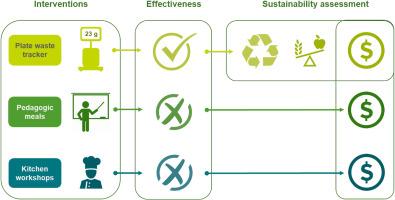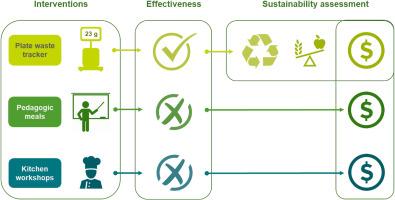作为学校餐饮业防止食物浪费措施的教育方法的可持续性评估
IF 10
1区 环境科学与生态学
Q1 ENGINEERING, ENVIRONMENTAL
引用次数: 0
摘要
学校膳食中有很大一部分被浪费掉了,导致学生错失营养机会、环境影响和经济损失。这项干预研究评估了三种教育方法(通过餐盘浪费跟踪器向客人提供反馈、教学餐和厨房工作坊)在减少欧洲(奥地利、德国和瑞典)学校食堂餐盘浪费方面的长期效果。干预措施结束后,进行了一项可持续性评估,包括环境、经济和社会方面的评估。结果表明,餐盘垃圾跟踪器显著减少了餐盘垃圾,从 23 克/人的较低基线水平减少了 17%(4 克/人),同时在实施后 15 个月内持续减少垃圾,显示出长期功效。这种减少降低了对环境的影响(每所学校每年减少 212 千克二氧化碳当量)和营养损失(每所学校每年减少 1018 兆焦耳、12 千克蛋白质和 4 千克纤维),同时证明成本效益高,投资回收期仅为 1-2 年。因此,尽管存在前期成本和实施障碍,学校食堂减少食物浪费的措施仍能在环境、经济和社会等方面带来可观的长期效益,使其成为可持续学校膳食计划的一项有价值的投资。本文章由计算机程序翻译,如有差异,请以英文原文为准。


Sustainability assessment of educational approaches as food waste prevention measures in school catering
A large proportion of school meals are wasted, leading to missed opportunities to nourish pupils, environmental impacts, and economic losses. This intervention study evaluated the long-term efficacy of three educational approaches (giving feedback to guests via plate waste tracker, pedagogic meals, and kitchen workshops) in reducing plate waste in school canteens across Europe (Austria, Germany, and Sweden). Following the intervention, a sustainability assessment was conducted, including environmental, economic, and social perspectives. The results showed that the plate waste tracker significantly reduced plate waste, by 17% (4 g/guest) from an already lower baseline level of 23 g/guest, while demonstrating long-term efficacy with sustained waste reduction up to 15 months post-implementation. This reduction lowered the environmental impacts (by 212 kg carbon dioxide equivalents per school & year) and nutrient losses (1018 MJ, 12 kg protein, and 4 kg fiber per school & year), while proving cost-effective with a payback period of only 1–2 years. Therefore, despite upfront costs and implementation barriers, food waste reduction measures in school canteens provide substantial long-term benefits across environmental, economic, and social dimensions, making them a valuable investment for sustainable school meal programs.
求助全文
通过发布文献求助,成功后即可免费获取论文全文。
去求助
来源期刊

Journal of Cleaner Production
环境科学-工程:环境
CiteScore
20.40
自引率
9.00%
发文量
4720
审稿时长
111 days
期刊介绍:
The Journal of Cleaner Production is an international, transdisciplinary journal that addresses and discusses theoretical and practical Cleaner Production, Environmental, and Sustainability issues. It aims to help societies become more sustainable by focusing on the concept of 'Cleaner Production', which aims at preventing waste production and increasing efficiencies in energy, water, resources, and human capital use. The journal serves as a platform for corporations, governments, education institutions, regions, and societies to engage in discussions and research related to Cleaner Production, environmental, and sustainability practices.
 求助内容:
求助内容: 应助结果提醒方式:
应助结果提醒方式:


